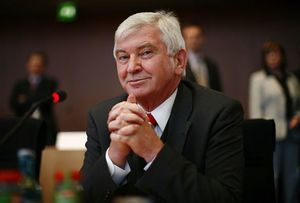Ernst Uhrlau
( spook, banker) | ||||||||||||||||
|---|---|---|---|---|---|---|---|---|---|---|---|---|---|---|---|---|
 | ||||||||||||||||
| Born | 1946 | |||||||||||||||
| Nationality | German | |||||||||||||||
Former BND chief
| ||||||||||||||||
Ernst Uhrlau was President of the German Federal Intelligence Service (BND) 2005-2011 and then went over work for Deutsche Bank.
Life
After graduating from high school in Eppendorf in 1967, Uhrlau studied political science , sociology and economics at the University of Hamburg. In 1974 he became a teacher at the Hamburg State Police School; from 1975 to 1981 he worked as a personal advisor and head of the senator's office under Werner Staak and Alfons Pawelczyk in the Hamburg internal affairs department. He then worked from 1981 to 1991 as deputy head of the internal intelligence service State Office for the Protection of the Constitution in Hamburg and from 1991 to 1996 as its head. In 1996 Ernst Uhrlau became the Hamburg chief of police.
Career in Berlin
In 1998 Uhrlau moved to the capital Berlin, where, after the SPD's election victory and the red-green takeover of government, he became Head of Department VI (Federal Intelligence Service, Coordination of Federal Intelligence Services ) in the Federal Chancellery. As the representative of the coordinator of the federal intelligence services - the head of the Federal Chancellery - Uhrlau was the link between the Federal Government and the Federal Intelligence Service, the Federal Office for the Protection of the Constitution (BfV) and the Military Counter-Intelligence Service (MAD).
BND
On December 1, 2005, Uhrlau succeeded August Hanning as President of the Federal Intelligence Service. His first case in this office was the kidnapping of the archaeologist Susanne Osthoff.
One of the well-known successes of his work is the exchange of prisoners, mediated by Uhrlau as an "honest broker", in January 2004 between Israel and the Lebanese-Shiite movement Hezbollah.[1]
Uhrlau approved the Eikonal operation of the Federal Intelligence Service and the US NSA, in which data from Deutsche Telekom and phones from Austria were tapped. The secret wiretapping ran from 2004 to 2008 and was based on an agreement between the USA and Germany from 2002.[2]
In the scandal surrounding the kidnapping of the German-Lebanese Khaled al Masri, Uhrlau admitted in 2006 that the BND had been informed, but had not passed this information on immediately. The federal government decreed a reorganization of the BND top, through which Uhrlau had been assisting three vice-presidents since then.
Under him, the BND started investigations into tax evasion to Liechtenstein.
In April 2008 Uhrlau was confronted with demands for resignation after the Federal Intelligence Service monitored the Afghan Minister of Trade and Industry Amin Farhang in 2006 and recorded e-mails from the Spiegel reporter Susanne Koelbl. In a personal conversation Uhrlau apologized to Koelbl.
Uhrlau retired on December 31, 2011 due to age limits.
After leaving the BND, he got a job with Deutsche Bank.
Events Participated in
| Event | Start | End | Location(s) | Description |
|---|---|---|---|---|
| Munich Security Conference/2009 | 2009 | 2009 | Germany Munich Bavaria | The 45th Munich Security Conference |
| Munich Security Conference/2010 | 5 February 2010 | 7 February 2010 | Germany Munich Bavaria | An anti-war demonstration outside described it as "Nothing more than a media-effectively staged war propaganda event, which this year had the purpose of justifying the NATO troop increase in Afghanistan and glorifying the continuation of the war as a contribution to peace and stability." |
| Munich Security Conference/2011 | 4 February 2011 | 6 February 2011 | Germany Munich Bavaria | The 47th Munich Security Conference |